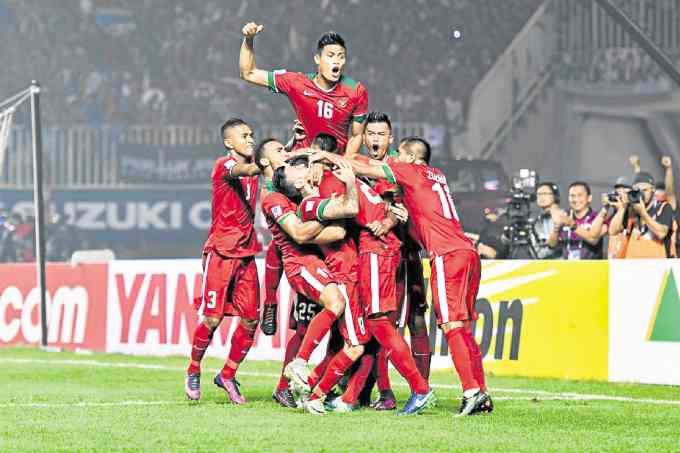Titanic finale
BANGKOK—The Philippines Azkals’ stint in the Asean Football Federation Suzuki Cup may have ended in heartbreak and disappointment a few weeks ago, but there are plenty of reasons why this year’s edition of the regional competition could end up as one of the most enthralling yet.
Regardless of the result of the championship match Saturday night, when Thailand and Indonesia collide in the second leg at Rajamangala Stadium here, Southeast Asia’s premier football competition already dished out thrill, excitement and drama that have been the trademark of the 20-year-old tournament.
Article continues after this advertisement“The AFF Suzuki Cup is the most entertaining and unpredictable tournament,” said former Azkals midfielder Chris Greatwich as he tweeted last week about the stoppage-time goal from 10-man Vietnam that sent its two-leg semifinal tie with Indonesia to extra time. “It’s unbelievable.”
Indonesia did come away with a 4-3 aggregate victory, but it was these types of games that have endeared the Suzuki Cup to football fans throughout the region. There’s just no shortage of late heroics and surprises.
The Azkals’ early elimination stings, considering that the country hosted the group stage for the first time, but Filipinos also witnessed the rise of an Indonesian side that entered the tournament with little expectation and grew from strength-to-strength.
Article continues after this advertisementThe Thais lived up to their billing as the fancied team in the tournament with glittering performances on their way to the finals, but their title-retention bid looked under threat after the first leg of the finals in Bogor, where the Indonesians, spurred on by the home crowd, prevailed, 2-1. There were encouraging displays from Myanmar and Cambodia in the group stages, while the tournament also exposed Malaysia and Singapore’s decline in recent years. For all their strong performances in the group stage, Vietnam again was denied of a spot in the finals after the brave Indonesians showed them the door in Hanoi last week.
In Bocaue, Bulacan, the Azkals were given a reality check that even one of their strongest lineups in recent years can’t cut it in the Suzuki Cup where teams just step up their games a notch with pride and honor of their countries at stake.
Hosting the “Group of Death” didn’t give the Azkals any luxury heading into the AFF Suzuki Cup. While preparation was already far from ideal with the team out of action for almost five months after the dramatic win over North Korea last March, coach Thomas Dooley’s charges also had to cope with injuries to key players Simone Rota and Patrick Reichelt. The unavailability of Javier Patiño, Daisuke Sato and Neil Etheridge also hurt the Azkals on both ends.
The Azkals collected just two points from three matches. A scoreless draw against Singapore to start the tournament came back to haunt the Azkals, who had fought bravely to forge a 2-2 draw with Indonesia on Phil Younghusband’s sublime free kick.
Needing to beat the Thais to qualify to the next round, the Azkals failed to hurdle the defending champions’ second stringers and suffered a 0-1 loss. That defeat would have been enough, but the Indonesians were growing in confidence as they tangled with Singapore for their last group match at Rizal Memorial Stadium. Stefano Lilipaly’s 84th-minute strike gave the Indonesians the victory and the second semifinal berth from Group A.
“It’s a disaster,” said Azkals midfielder Stephan Schrock. “But there’s always a tomorrow and there are always some positive things to take away. We’ll analyze that and come back stronger.”
The Azkals’ performance was a far cry from previous tournaments where they played with dogged determination and made themselves tough to break down even in enemy territory. Clearly, the team suffered from a lack of leadership on defense and their inability to finish off chances. There was plenty of criticism directed at coach Tom Dooley for his decision to play Younghusband at midfield, despite the skipper acquitting himself well in the position.
But there’s no doubt that the Indonesians are the story of the tournament as they reached the final for the fifth time in the tournament.
A dramatic 2-1 victory at Pakansari Stadium in Bogor in the first leg last Wednesday evoked dramatic scenes on the pitch and in the grandstand as the Merah Putih closed in on a first title.
Indonesian supporters were also out in full force on social media, beaming with pride over their team’s stunning victory using the hashtag #TimnasJuara, which means “champion team” that trended worldwide with more than 50 million tweets.
Indonesian President Joko Widodo, who attended the semifinal game at Bogor, also congratulated the national team together with Vice President Jusuf Kalla, who later congratulated the Garudas on the field at full time.
“The Indonesian national team was incredible,” Kalla said. “The battle isn’t finished yet. Keep the spirit!”
“Ultimately, the key has been playing as a team, and our spirit has been incredible,” Indonesia coach Alfred Reidl said.
The win also crushed the Thais’ aura of invincibility in the tournament. The defending champions had gone four matches without conceding a goal until they faced the same Indonesian team that gave them all they could handle in the very first match of the tournament in Bulacan.
“In the Suzuki Cup, we have to win. We are not interested in second place,” said Thai coach Kiatisuk Senamuang. “Only winning is important for us.”
But while he is just as determined to lead the Thais to glory, the coach known as Zico for his style of play that closely resembled that of the elegant Brazilian striker may have also summed up what the Suzuki Cup means to the region.
“The tournament is just a great celebration of football for Southeast Asia and I hope the fans were able to enjoy it,” he said.
